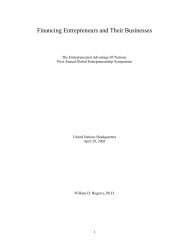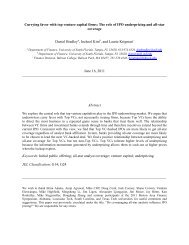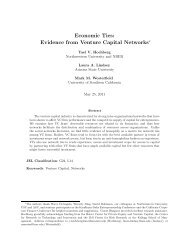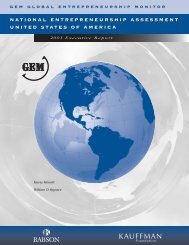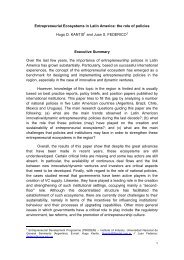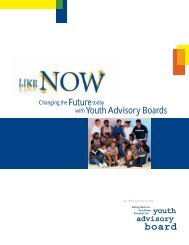Financing Child Care in the United States - Ewing Marion Kauffman ...
Financing Child Care in the United States - Ewing Marion Kauffman ...
Financing Child Care in the United States - Ewing Marion Kauffman ...
You also want an ePaper? Increase the reach of your titles
YUMPU automatically turns print PDFs into web optimized ePapers that Google loves.
CHILD CARE CAREER AND WAGE<br />
LADDER (WASHINGTON)<br />
DESCRIPTION<br />
The Wash<strong>in</strong>gton State <strong>Child</strong> <strong>Care</strong> <strong>Care</strong>er and Wage<br />
Ladder is a pilot project to support wage <strong>in</strong>crements<br />
(based on education and experience) for early childhood<br />
teachers <strong>in</strong>100 child care centers across Wash<strong>in</strong>gton<br />
State. Participat<strong>in</strong>g centers are required to comply with<br />
quality guidel<strong>in</strong>es and to f<strong>in</strong>ance wage <strong>in</strong>creases based<br />
on longevity and <strong>in</strong>creased responsibilities.<br />
WHEN ESTABLISHED<br />
In July 1999, Governor Gary Locke (D) allocated $4<br />
million for <strong>the</strong> <strong>in</strong>itiative for fiscal years 2000 and 2001.<br />
In April 2000, child care centers were selected to<br />
participate <strong>in</strong> <strong>the</strong> demonstration project.<br />
ANNUAL AMOUNT<br />
A total of $4 million of Temporary Assistance for Needy<br />
Families (TANF) re<strong>in</strong>vestment funds was allocated for <strong>the</strong><br />
two–year demonstration project. Estimated costs for a<br />
statewide <strong>in</strong>itiative are $15 million a year.<br />
SERVICES FUNDED<br />
The <strong>in</strong>itiative will fund wage <strong>in</strong>crements for staff <strong>in</strong> early<br />
childhood programs, <strong>in</strong>clud<strong>in</strong>g assistants, associate and<br />
lead teachers and program supervisors, based on relevant<br />
education. Centers will be required to use <strong>the</strong>se funds to<br />
<strong>in</strong>crease staff wages by 50 cents an hour for various<br />
types of educational atta<strong>in</strong>ment, start<strong>in</strong>g with a high<br />
school degree and mov<strong>in</strong>g up through a <strong>Child</strong><br />
Development Associate Credential, Early <strong>Child</strong>hood<br />
Education Certification, and A.A., B.A., and M.A. degrees<br />
<strong>in</strong> child development. In addition, participat<strong>in</strong>g centers are<br />
required to use <strong>the</strong>ir own revenues to raise wages 25<br />
cents an hour, based on experience. State funds will<br />
assist with <strong>the</strong>se wages <strong>in</strong>creases, based upon <strong>the</strong><br />
percentage of subsidized, low–<strong>in</strong>come children be<strong>in</strong>g<br />
served by <strong>the</strong> facility.<br />
HOW FUNDS DISTRIBUTED<br />
State funds are awarded to selected child care centers,<br />
both nonprofit and proprietary, based on a Request for<br />
Proposals (RFP).<br />
POPULATION SERVED<br />
The <strong>in</strong>itiative targets staff <strong>in</strong> participat<strong>in</strong>g licensed or<br />
certified centers. The centers are required to:<br />
• Adopt <strong>the</strong> career–development wage scale;<br />
• Fill 10 percent of <strong>the</strong>ir slots with children that receive<br />
child care subsidies from <strong>the</strong> state; and<br />
• Contribute $25 a month toward any health care<br />
premium paid by employees.<br />
STRATEGIC CONSIDERATIONS<br />
• The Economic Opportunity Institute (EOI), a nonprofit<br />
public policy <strong>in</strong>stitute, did <strong>the</strong> <strong>in</strong>itial policy development<br />
for <strong>the</strong> project and educated <strong>the</strong> relevant officials. The<br />
proposal received strong support from Governor Locke<br />
and House Speaker Frank Chopp (D).<br />
• Governor Locke charged <strong>the</strong> Department of Social and<br />
Health Services, Office of <strong>Child</strong> <strong>Care</strong> Policy (OCCP),<br />
with develop<strong>in</strong>g and implement<strong>in</strong>g <strong>the</strong> <strong>in</strong>itiative based<br />
on prelim<strong>in</strong>ary work done by EOI.<br />
• Provider stakeholder groups were established across<br />
<strong>the</strong> state. These groups helped to review and revise <strong>the</strong><br />
<strong>in</strong>itiative to ensure that it was feasible from a provider<br />
perspective. To ensure participation by a diverse group<br />
of child care centers, OCCP attempted to make <strong>the</strong><br />
wage ladder as flexible as possible while ma<strong>in</strong>ta<strong>in</strong><strong>in</strong>g<br />
<strong>the</strong> <strong>in</strong>tent of <strong>the</strong> <strong>in</strong>itiative.<br />
• Prior to develop<strong>in</strong>g this <strong>in</strong>itiative, child care workers<br />
organized <strong>in</strong>to a union and established an <strong>in</strong>dependent<br />
voice. This was a key factor <strong>in</strong> secur<strong>in</strong>g state funds<br />
targeted to wages. EOI worked closely with <strong>the</strong> <strong>Child</strong><br />
<strong>Care</strong> Union Project (sponsored by District 925 of <strong>the</strong><br />
Service Employees and Seattle Worthy Wages).<br />
• The Seattle City Council approved additional fund<strong>in</strong>g<br />
for T.E.A.C.H. The council determ<strong>in</strong>ed that expand<strong>in</strong>g<br />
T.E.A.C.H. would help more staff to “climb <strong>the</strong> wage<br />
ladder” and <strong>the</strong>refore be eligible for higher wages.<br />
• Compensation approaches to date have focused on<br />
two models: award<strong>in</strong>g compensation supplements 1) to<br />
programs or 2) to staff directly. These approaches have<br />
strengths and weakness. Decid<strong>in</strong>g which model to<br />
adopt will depend on a variety of factors, <strong>in</strong>clud<strong>in</strong>g<br />
attitudes about accountability, organized labor,<br />
perspectives of for–profit and nonprofit programs and<br />
status of career–development efforts.<br />
OTHER SITES WITH SIMILAR STRATEGIES<br />
K<strong>in</strong>g County, Wash<strong>in</strong>gton, has approved an ord<strong>in</strong>ance to<br />
augment child care employee wages <strong>in</strong> <strong>the</strong> City of<br />
Seattle, and is considered likely to allocate $300,000 for<br />
this purpose.<br />
Ill<strong>in</strong>ois recently enacted a wage supplementation bill<br />
called “Great Start” and allocated $3 million of its federal<br />
<strong>Child</strong> <strong>Care</strong> and Development Fund for <strong>the</strong> <strong>in</strong>itiative. For<br />
<strong>in</strong>formation, contact Elissa Bassler at <strong>the</strong> Day <strong>Care</strong><br />
Action Council (773) 769 8020 or<br />
elissa@daycareaction.org.<br />
Salary enhancement legislation passed <strong>in</strong> New York <strong>in</strong><br />
2000 and was funded at $40 million. For more<br />
<strong>in</strong>formation, contact Agnes Zell<strong>in</strong> at <strong>the</strong> New York State<br />
<strong>Child</strong> <strong>Care</strong> Coord<strong>in</strong>at<strong>in</strong>g Council at (513) 463 8663 or<br />
e–mail: agnes@nyscccc.org.<br />
68






